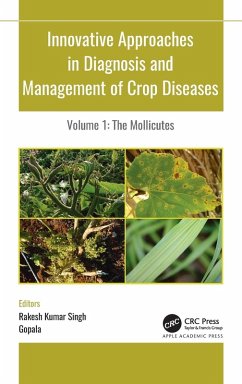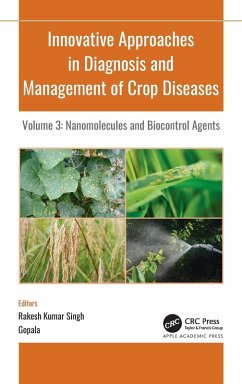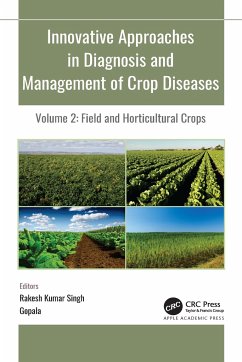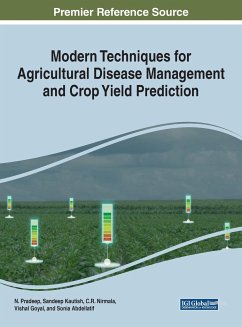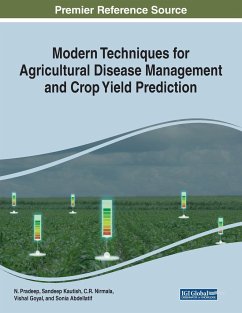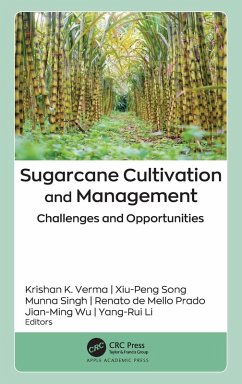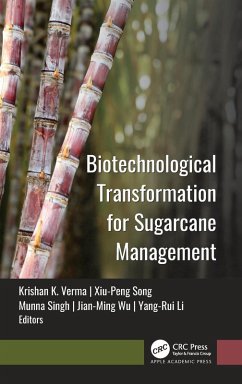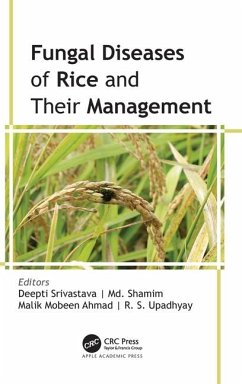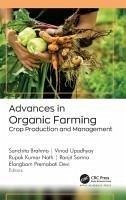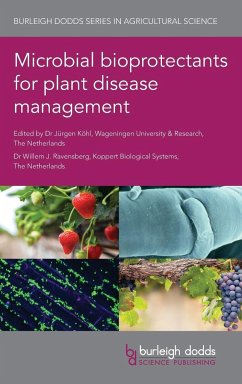Gebundenes Buch
New Advances in Crop Disease Management
Versandkostenfrei!
Versandfertig in 1-2 Wochen
Weitere Ausgaben:

PAYBACK Punkte
120 °P sammeln!




Overviews the diverse crop protection strategies emphasising the recent advances in crop protection approaches, fundamental concepts, principles, methodology, relationships, and benefits for crop protection and human health. Covers several disciplines related to plant pathology, biochemistry, precision agriculture etc.
Sangita Sahni, PhD, is an Assistant Professor-cum-Scientist in the Department of Plant Pathology, Tirhut College of Agriculture, Dholi, Dr. Rajendra Prasad Central Agricultural University, Pusa, Samastipur, Bihar, India. She has published or edited more than 10 books, several book chapters, and a number of research papers in national and international journals. She has isolated several bacterial isolates from different sources and submitted their sequences to the National Centre for Biotechnology Information (NCBI). Dr. Sahni has been awarded with a Dr. Rajendra Prasad National Education Shikhar Award for her outstanding contribution in the field of education, a Young Scientist Award, Innovative Scientist of the Year Award 2015, and many other prestigious awards for her outstanding contribution in the field of plant pathology. She serves as an editor in three international peer-reviewed journals (Current Journal of Applied Science and Technology, International Journal of Plant & Soil Science, Asian Plant Research Journal, and Agriculture Letters). She is involved in the All India Co-ordinated Research Programme in MULLaRP, Chickpea and Small Millets at T.C.A., Dholi, and PI of BRNS, Govt. of India-funded project. Dr. Sahni earned her PhD (Agriculture) in Mycology and Plant Pathology from the B.H.U, Varanasi. Subsequently, she worked as a postdoctoral research fellow at the University of Western Ontario University, London, Ontario, Canada. Ganesh Thapa, PhD, is a Biohazards Advisor at Trinity College of Dublin, Ireland. During the first wave of Corona pandemic 2020-21, he provided expert advice, guidance, and CL3 training to all Trinity researchers and affiliated hospitals to work in SARS-Cov-2 and helped open two SARS-Cov-2 screening centers in Trinity College of Dublin. Previously, he worked as a leading scientist at the Centre for Peptide Research at the University of KwaZulu-Natal, Durban, South Africa, to develop HIV-1 protease inhibitors for multidrug-resistant patients suffering from both TB and HIV. He then joined University of Dublin from 2014 to 2018 and developed TILLING wheat lines resources resistant to Fusarium head blight and lodging tolerant through mutation of activation loop of receptor kinase. During this period, he was awarded a world patent on ""Fusarium head blight disease resistance."" He also worked as Research Fellow at the University of Limerick, Ireland, and discovered and validated anti-inflammatory peptides from blue whiting for therapeutics use against allergy and autoimmune disease in humans. He earned his PhD degree in Biosciences & Bioengineering from the Indian Institute of Technology Guwahati, Assam, India, working on phytoremediation of heavy metal contaminated sites. Bishun Deo Prasad, PhD, is an Associate Professor in the Department of Agricultural Biotechnology & Molecular Biology, College of Basic Sciences and Humanities, Dr. Rajendra Prasad Central Agricultural University, Pusa, Samastipur, Bihar, India. He has published several research papers in reputed peer-reviewed international journals with more than 300 citations. He has also published authored books, edited books, several book chapters, and practical manuals for undergraduate and postgraduate courses. He has submitted several sequences (bacterial, fungal, and plant) to the National Center for Biotechnology Information (NCBI). He has also submitted bacterial isolates to the National Bureau of Agriculturally Important Microorganisms (NBAIM). He serves as an editor for three international peer-reviewed journals (Current Journal of Applied Science and Technology, Journal of Experimental Agriculture International, and Journal of Plant Science Current Research). Dr. Prasad has received a DAE- Young Scientist Research Award in 2013 and a Fast Track Scheme for Young Scientists Award from the Department of Science & Technology (DST), India, in 2012. He has also been awarded with an Outstanding Achievement Award, Inventor of the Year Award-2015, and ICAR-sponsored Best Teacher Award (2018) at Bihar Agricultural University, Sabour. Dr. Prasad earned his PhD from M.S. University, Baroda, Gujarat, India. He also worked at the John Innes Centre (JIC), Norwich, UK, during his PhD. Subsequently, he worked as a post-doctoral research fellow at the University of Western Ontario University, London, Ontario, Canada.
Produktdetails
- Verlag: Apple Academic Press
- Seitenzahl: 492
- Erscheinungstermin: 8. November 2024
- Englisch
- Abmessung: 240mm x 161mm x 31mm
- Gewicht: 898g
- ISBN-13: 9781774916070
- ISBN-10: 177491607X
- Artikelnr.: 70897217
Herstellerkennzeichnung
Libri GmbH
Europaallee 1
36244 Bad Hersfeld
gpsr@libri.de
Für dieses Produkt wurde noch keine Bewertung abgegeben. Wir würden uns sehr freuen, wenn du die erste Bewertung schreibst!
Eine Bewertung schreiben
Eine Bewertung schreiben
Andere Kunden interessierten sich für




